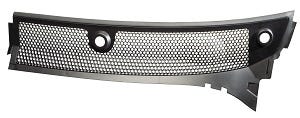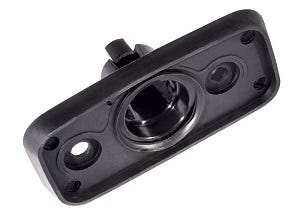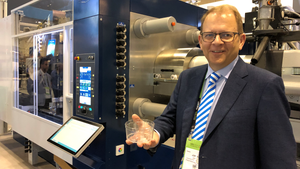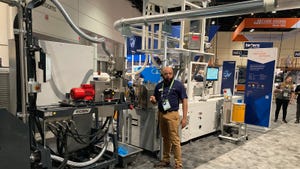Styrenic TPEs address over-engineering concerns in automotive applications
by Jeffrey E. Dickerhoof, senior marketing and sales manager for the Thermoplastic Elastomer Division of Teknor Apex
December 31, 2015
by Jeffrey E. Dickerhoof, senior marketing and sales manager for the Thermoplastic Elastomer Division of Teknor Apex
Rapid change taking place in the automotive industry means new growth opportunities for TPEs. At the simplest level, every new design alteration or vehicle model opens the potential for TPEs to replace thermoset rubber and flexible plastics in longstanding applications. But often the changes under way transcend what has been longstanding practice in building cars, creating demand for new types of components, new vehicle functions, and new concepts in design. The versatility and design freedom of TPEs make them prime candidates for meeting this demand.
|
Light weight, low cost styrenic block copolymers (SBCs) can potentially replace heavier materials such as EPDM in automotive sealing applications. |
|
Possible interior applications include mirror gaskets. |
One of the most interesting developments in automotive TPEs has been the increase in use of styrenic block copolymer (SBC) TPEs both as alternatives in applications where thermoplastic vulcanizates (TPVs) could be considered "over-engineered" with respect to performance requirements, and in uses where SBCs provide unique advantages. In keeping with its mission of offering multiple compound choices for the same application, Teknor Apex has expanded options for automotive manufacturers by developing a diversified portfolio of new SBC elastomers that it offers alongside the comprehensive range of TPV compounds for which its Sarlink range of products is well known.
With the continued emphasis on "luxury" features in automotive interiors, SBCs provide special consumer value because of their good haptics, scratch and mar resistance, stain resistance, and minimal emission of VOCs. Low hardness grades provide extra softness and comfort. The availability of custom compounding from Teknor Apex makes possible a variety of colors and finishes from matte to gloss.
As always in the auto industry, there is pressure to find new ways of saving weight and reducing costs. A number of Sarlink SBC grades are less dense that either EPDM, PVC, or TPVs, and their higher flow capabilities in comparison with TPVs and other TPEs result in faster cycle times.
Among the first of the SBC products to be introduced by Teknor Apex have been a number of extrusion grades, particularly for automotive sealing systems, as well as injection molding grades for window encapsulation. Now the company has introduced a group of injection molding compounds that exhibit higher flow than comparable TPV grades, enabling them to be molded into more complex, intricate geometries and to improve cycles through reduced packing and cooling times:
For interior applications, Sarlink ML-1100 Series and ML-1600 Series styrenic TPEs are general-purpose and enhanced-performance offerings, respectively, and are both available in a wide range of hardness levels. Particularly in applications where TPVs usage may constitute over-engineering, the styrenic TPEs also provide cost advantages.
Recommended by Teknor Apex for such automotive interior applications as bin mats, cup holder liners, and soft-touch grips for knobs and buttons, the styrenic TPEs are already in commercial use in applications for Chrysler, Ford, and General Motors. They are UV-stable, resist abrasion and scratching, are easily colored, provide good surface appearance and tactile properties, and exhibit low fogging and odor. Unlike many TPVs, they do not require pre-drying prior to molding.
For exterior applications, Sarlink ME-2200 Series styrenic TPEs may also provide cost savings over TPVs while still meeting the performance requirements of the part. Like TPVs, the Sarlink ME-2200 series compounds are less dense than EPDM and PVC, yielding weight savings of up to 15 and 23%, respectively.
Sarlink ME-2200 Series styrenic TPEs are available in hardnesses from 65 Shore A to 40 Shore D. They exhibit excellent UV stability, provide good flexibility over a wide temperature range, and yield a Class A surface appearance. The compounds are readily colored and do not require pre-drying prior to molding.
The Sarlink range of automotive elastomers now includes compounds based on multiple TPE chemistries, including TPVs that exhibit superior compression set and durability, SBCs that offer excellent heat and UV stability, olefinics characterized by good low-temperature impact resistance and flexibility, and diverse alloys for adhesion to rigid engineering thermoplastic substrates. Among these materials are compounds that have received more than 70 OEM approvals for use in under-hood, interior, exterior, and sealing applications.
Teknor Apex produces these TPEs in the United States, Belgium, and Singapore. For customers that manufacture automotive components at multiple international locations, the company can supply identical formulations globally, with local access to engineering and support services. It provides a wide range of resources for application development and testing.
At the recently expanded Application Development Laboratory in Leominster, MA, for example, Teknor Apex provides design and launch support using FEA, CAD, Moldflow and prototyping equipment that replicates the customer's process. Engineers can help with weight and cost-reduction projects and provide tools for customers to explore ideas, solve production issues, and minimize downtime for trial runs. The facility includes production-scale equipment that provides real-time part and process screening. The lab can take design concepts from simulation software to actual parts and provides on-site scale-up and production support.
About the Author(s)
You May Also Like



